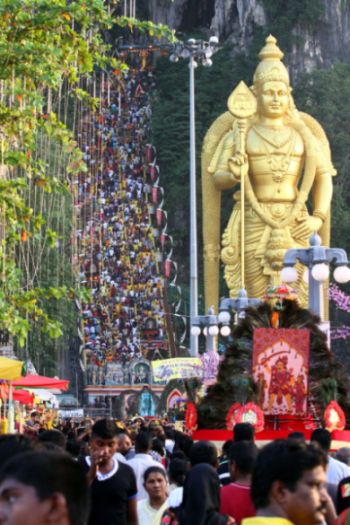TO some people, Thaipusam may just be another public holiday but to Hindus, it is a sacred time which commemorates the occasion when Hindu Goddess Parvati gave her son, Murugan, a vel (spear) so he could vanquish the evil demon Soorapadam.
Leading up to the festival, devotees cleanse themselves through prayer, fasting and practising celibacy, and on the day of the festival, shave their heads and undertake a pilgrimage.
In Malaysia, the most popular spot to observe this festival is at Batu Caves in Kuala Lumpur, which attracts over a million devotees and tens of thousands of tourists every year.
The procession for devotees begins at Sri Mahamariaman Temple at Jalan Tun H. S. Lee in the city and ends at Batu Caves, lasting around eight hours altogether.
Kavadi (offering) carriers are devotees who have requested favours, or have had their favours granted or wish to atone for past misdeeds.
Most women devotees carry pots of milk on their heads or a pair of coconuts slung over their shoulders, as not many have their bodies pierced.
Some devotees’ kavadis are larger – metal frames elaborately decorated because they believe that the bigger the offering, the bigger his or her devotion.
The belief that the only way to salvation is to endure pain is why some devotees pierce their bodies with spears and hooks under a trance-like state.
At the end of the pilgrimage, devotees lay down their kavadi and their offerings of milk or honey are poured on the statue of the deity as an act of thanksgiving,
Apart from the Batu Caves, other popular spots for celebrating Thaipusam in Malaysia are the Sri Subramaniar Temple in Gunong Cheroh, Perak and at the Nattukottai Chettiar Temple in Penang.


Tell us what you think!